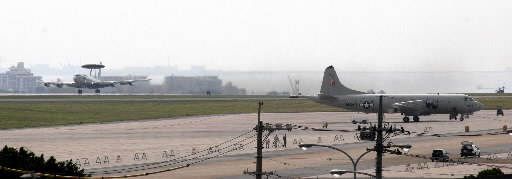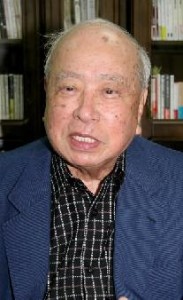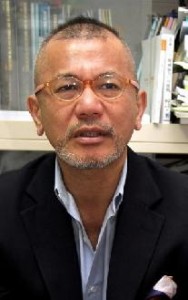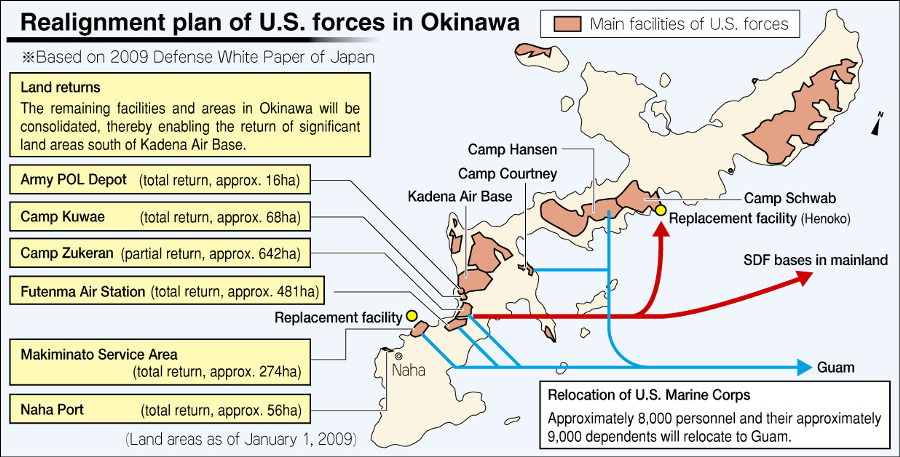Nuclear weapons can be eliminated: Special Series, Part 12
Feb. 13, 2010
Special Series: The Day the Nuclear Umbrella is Folded
Part 12: Japan-U.S. Security Treaty burdens Okinawa
by the "Nuclear Weapons Can Be Eliminated" Reporting Team
Governing Okinawa after World War II, the United States brought nuclear weapons into the southern islands of Japan. This is why the call was made, when Okinawa was returned to Japan in 1972, that nuclear weapons be banned from Okinawa just as they were on the mainland. However, Okinawa Prefecture is still the site of about 75 percent of U.S. military bases in Japan. The prefecture has borne the lion's share of the burden of supporting the Japan-U.S. Security Treaty while the lives of its residents have been put at risk.
At the top of the agenda for Japan and the United States is now the matter of the new location for the U.S. Marine Corps Air Station in Futenma, located in the city of Ginowan and surrounded by homes and schools. Tokyo has yet to reach a decision on where the air station will be relocated. On February 1 the Pentagon released its "Quadrennial Defense Review" and insisted that Japan abide by the 2006 bilateral agreement, which stipulates that the air station be relocated within the prefecture.
We would like to consider the policies of the Japan-U.S. security relationship, which provides the basis for the "nuclear umbrella," from the standpoint of Okinawa.
Military bases are concentrated in Okinawa
Most of the U.S. military bases in Okinawa were relatively quiet when a joint military exercise began in Thailand early this month, conducted by major allies including the United States, Japan, and South Korea. But at the Kadena Air Base, located in the town of Kadena, U.S. fighters were splitting the air with their take-offs and landings.
In October 2008, Hans Kristensen of the Federation of American Scientists analyzed some declassified documents of the U.S. Air Force and discovered that, in 1958, atomic bombs with 200 times the explosive power of the bomb dropped in Hiroshima were stored at the Kadena Air Base. In 1999, experts in the United States stated in a science journal that Okinawa, at the peak of this stockpiling, had some 1,200 nuclear warheads.
How, then, have the people of Okinawa been feeling about the presence of nuclear weapons within their borders?
Namijitsu Sakiyama, 64, was tending a potato field, located right next to a U.S. base. Part of the field, in fact, once belonged to the base. "Before Okinawa was returned to Japan," he said, "I heard people who had entered the base to perform plumbing or engineering work say that there were nuclear weapons there."
Michiaki Tokashiki, 59, the Kadena town official in charge of military base affairs, remarked, "I heard the rumor when I was a child. If it's true, it's frightening."
One official in the town of Yomitan said, "I heard that city officials who entered the ammunitions depot saw the symbol for nuclear weapons."
In 1984, the University of the Ryukyus released a report on the changes in attitudes of Okinawa residents after the reversion to Japan. The report cited the results of public-opinion polls conducted by the mass media in 1972, 1973 and in 1982, and showed that 59 to 86 percent of respondents believed that nuclear weapons were stored in Okinawa. About ten percent of the prefecture's land is occupied by U.S. military bases. Even after Okinawa was returned to Japan in 1972 and the Japan-U.S. Military Treaty began to be applied to this prefecture, Okinawa residents have indicated that they still believe nuclear arms are being held in their backyard.
Within a range of one kilometer from the U.S. Marine Corps Air Station at Futenma, there are 17 educational facilities including elementary schools and universities. In August 2004, a large helicopter crashed onto the campus of Okinawa International University, located south of the air station. Though fortunately there were no injuries to the students or other private citizens, this incident underscored the risk of maintaining a military base in the middle of a densely populated area.
As far as the prefectural government has been able to ascertain, 487 accidents involving U.S. military aircraft occurred in the prefecture during the 37 years leading to the end of 2008. And the number of crimes involving U.S. military personnel reached 5,584.
Shigeo Yamauchi, director of the Department of Military Base Affairs Policy of the city of Ginowan, which hosts the Futenma Air Station, raised a question to all Japanese citizens, saying, "We have been told that deterrence is indispensable for the security of Japan, and therefore bases were necessary. But are they really necessary and do they lead to the security of the people of Japan? Shouldn't we have a thorough debate about Japan security policy, including the nuclear umbrella and its value as a deterrent?"
Interviews with experts on the future of the nation's security
Masahide Ota, former Governor of Okinawa Prefecture: Using the Security Treaty to justify demands
What is the basis for your opinion that the Japan-U.S. Security Treaty should be brought back to square one and a Japan-U.S. "peace and amity treaty" should be concluded?
Who and what is the Security Treaty for? We have to calmly and objectively analyze whether the treaty is really necessary for the security of Japan, and whether the treaty is functional from a practical standpoint. The United States will naturally give priority to its own national interests. This should make us realize that the Security Treaty in fact poses risks. The United States, against the backdrop of the sluggish economy, will attempt to place greater demands on Japan, exploiting the treaty. In fact, the United States has already raised such issues as the right of collective defense and amendments to the Japanese Constitution. This situation endangers Japan's future.
A disproportionately large number of U.S. military bases are located in Okinawa, and yet the United States still contends that Futenma Air Station be relocated to Henoko, another site in Okinawa. This is because the Japanese government has been shouldering an excessive amount of expense for the bases within its budget allocations. Now that wars are fought mainly with missiles, we have to question the merit of hosting these military bases. We should weigh what Japan should do for its own national interests, including a revision of the Security Treaty. Japan should promote more harmonious relationships with other Asian nations by means other than military power, and win their trust. A reliance on military power, a policy at the other end of the spectrum, will not bring about a lasting solution to the problem.
Why do you propose that all U.S. military bases be moved out of Okinawa?
Some people argue that hosting military bases contributes to Okinawa's economy, but this is mistaken. We should estimate how much economic benefit would be gained by replacing the bases with private facilities.
One example is the site of the former Hamby Air Field, which was returned to Japan in 1981. The former air field (located in the town of Chatan) has been transformed into a commercial area with a large shopping mall. The base used to employ some 100 Japanese citizens, but the number of present workers in this area exceeds 9,000. In 2009, more than 250 million yen was paid to the town as real-estate taxes, compared with some 3.6 million yen when the land was used as an air field.
However, the per capita income of Okinawa has been the lowest among all the nation's prefectures ever since such statistics were made available in 1972. This is the reality of Okinawa, burdened by military bases. Still, some argue that the Futenma Air Station should be relocated somewhere within the prefecture. Constructing a new base will lead to the permanent existence of military bases in Okinawa. The central government argues that the Security Treaty is advantageous to Japan's national interests, but is unwilling to transfer some of the burdens onto the mainland. The idea of moving the base within the prefecture is a clear bias against Okinawa.
What are your thoughts on the nuclear umbrella in the context of the Japan-U.S. Security Treaty?
Even though Japan has joined the Nuclear Non-proliferation Treaty and has long appealed for the elimination of nuclear weapons, it will not earn the trust of other nations as long as it is protected by the nuclear umbrella. On the contrary, whatever Japan says will not be taken seriously. I believe that nuclear weapons should be eliminated. When Barack Obama was elected president of the United States, my hope was renewed. During my days as a student in the United States, I never imagined there would one day be a black president. What I thought was impossible has become a reality.
Many citizens of Okinawa believe that nuclear weapons are still stored on military bases here, since no one has confirmed that the weapons have been taken out of the prefecture. Just like the issue of the secret agreements, the problem is that military affairs are always shrouded in secrecy.
Profile
Masahide Ota
Masahide Ota was born in Okinawa in 1925. After graduating from Waseda University, he finished a post-graduate course at Syracuse University in the United States. Mr. Ota was professor at the University of the Ryukyus before he was elected Governor of Okinawa in 1990. After serving two terms as governor, he served one term as a member of the House of Councilors from 2001. Mr. Ota is currently president of the Ota Peace Research Institute.
Masaaki Gabe, professor at the University of the Ryukyus: Marine bases unnecessary in Japan
In the Lower House election held last August, not a single seat in Okinawa Prefecture was won by candidates backed by the Liberal Democratic Party. How do you analyze the political situation in the prefecture in relation to the Japan-U.S. Security Treaty?
The election results were likely fueled by a tide of public opinion related to daily life in Okinawa. The change of administration was thus a great turning point. Since last August, candidates backed by the Democratic Party of Japan have won in the elections for local governments in the prefecture. After the issues involving the Futenma Air Station were brought to the public's attention, the people, who had been feeling dispirited, realized that they could effect change to the government and make a difference by speaking out.
The issue of Futenma has no easy answers, but the positive aspect to the problem is the fact that it is now being discussed in plain view. Political issues between Japan and the United States are being discussed openly. We should seize this opportunity to weigh the Japan-U.S. alliance and what sort of position Japan should hold in the international community in the future.
Why is Japan lacking in strategies of its own in the area of security?
Lacking its own strategies, Japan has always followed those presented by the United States. The LDP administrations did not have a full understanding of U.S. security strategies, nor did they seek to understand them. And in the time of the Cold War, the heavy burden was laid on Okinawa, these distant islands from the mainland, because it was cheaper. They must have thought they could silence people by handing out small amounts of money.
Since the end of the Cold War, methods involved in military operations have changed greatly, and potential threats to our national security have also changed. Do we still need the U.S. forces in Japan? If so, how large should the force be? We have not determined the suitable scale for military power. According to the realignment plan for U.S. military forces, 8,000 personnel will be transferred to Guam. If Japan really needs the U.S. military forces, people would be startled and beg them to stay in Japan. But nobody has asked them to do so.
What is your image of the ideal presence of U.S. forces in Japan?
I don't think Japan needs the Marines, who fight on the front lines of battle. The Marines are in Japan only because they have a base in Futenma. Moving only Futenma Air Station to Guam would create inconvenience in terms of coordination with other bases in Okinawa. This is why the United States has wanted to relocate it within the prefecture. If the air station is moved out of Okinawa, the other Marine bases would have to be moved, too.
I don't think, though, that removing all the bases from Okinawa would be a good idea. To maintain a balance of power in Asia, some of the Air Force and Navy bases should remain for the time being. Then gradually the scale of these bases could be reduced. As Japan's economic power weakens, the worth of the Japan-U.S. Security Treaty will erode. It will become senseless to bear the heavy expense involved in maintaining the military alliance.
How can Okinawa and Hiroshima provide mutual support?
People in Hiroshima may consider their city a victim of the atomic bombing, while people in Okinawa perhaps feel they are forced to the aggressor's side by hosting U.S. military bases. Hiroshima experienced the horror of the A-bomb attack, and Okinawa, through ground battles, learned the dreadful damage that conventional weapons can also cause. It is important that Hiroshima and Okinawa build a relationship where both can learn from each other's strengths and complement each other's weaknesses.
Profile
Masaaki Gabe
Masaaki Gabe, born in Okinawa Prefecture in 1955, is a professor of international relations at the University of the Ryukyus. After taking part in doctoral studies at Keio University, he assumed several posts, such as visiting researcher at the George Washington University, before taking up his current position in 1996. He is a specialist in the field of international politics.
(Originally published on February 7, 2010)
To comment on this article, please click the link below. Comments will be moderated and posted in a timely fashion. Comments may also appear in the Chugoku Shimbun newspaper.











